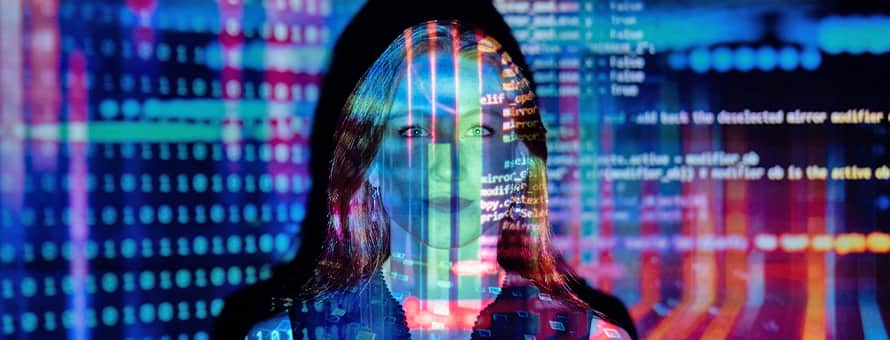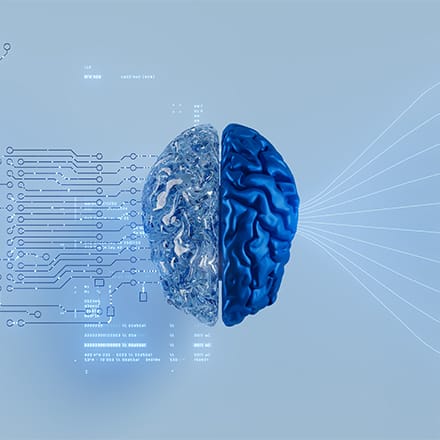How to Become a Data Scientist

Understanding the numbers
When reviewing job growth and salary information, it’s important to remember that actual numbers can vary due to many different factors—like years of experience in the role, industry of employment, geographic location, worker skill and economic conditions. Cited projections are based on Bureau of Labor Statistics data, not on SNHU graduate outcomes, and do not guarantee actual salary or job growth.
Imagine having the power to unlock insights hidden within giant piles of data. Where someone might see a million pieces of the puzzle, you're able to put them together and see the full picture.
If you love solving problems and looking for patterns, a role in data science might be a good fit for you. As a data scientist, you can influence decision-making at the highest levels of an organization and drive innovation across the industry you work in. But what does a data scientist actually do, and how can you become one?
What is Data Science?
Data science is an umbrella term for a broad field. If you're interested in a data science career, a good first step is knowing what "data science" actually means.
According to Tableau, a leading data visualization company, data science refers to a wide-ranging field and study that aims to examine real-world data, looking for trends and opportunities. This is important because when companies use data to influence short-term and long-term decisions, they're able to limit how much guesswork they have to do — and have better chances at getting the results they want.
 Often, data science will get confused with data analytics — and there's some overlap in what they do. According to Ben Tasker, adjunct faculty and former associate dean of AI and data sciences at Southern New Hampshire University (SNHU), the big difference between data science and data analytics is how each team member interacts with the data. In his experience:
Often, data science will get confused with data analytics — and there's some overlap in what they do. According to Ben Tasker, adjunct faculty and former associate dean of AI and data sciences at Southern New Hampshire University (SNHU), the big difference between data science and data analytics is how each team member interacts with the data. In his experience:
- Data scientists are responsible for creating the models that collect the data.
- Data analysts are responsible for figuring out what data is needed in the first place and how to present the findings after it's collected.
Data scientists and analysts might do slightly different jobs, but at the end of the day, they're on the same team. Both positions come with different responsibilities, and both can be a good fit for dedicated problem-solvers.
“Data science can be a very rewarding field,” said Dr. Brian Letort, an adjunct instructor of data analytics at SNHU. Letort wrote his first machine learning algorithm in 2003, and he has over 20 years of experience working in data science. In addition to teaching at SNHU, Letort has also served as the chief data scientist at Northrop Grumman and currently works as the chief architect over product and AI at Digital Realty.
“Data science has a bit of science and art within it,” Letort said, “and demonstrating creativity is certainly one of the more rewarding aspects.”
What Skills Do You Need to Be a Data Scientist?
The skills that you need to be a data scientist can be sorted into two categories, according to Tableau.
The first are technical skills you need to complete the tasks a data scientist does on a daily basis, like writing code, preparing data and utilizing artificial intelligence (AI).
The other kind of skills you need are non-technical skills like problem solving and critical thinking, Tableau said, which help you think about the data you're trying to collect and the software that's helping you collect them.
According to Letort, successful data scientists must possess skills across three main areas: programming, math/statistics and business knowledge. To him, when these three skills work together, data scientists can successfully:
- Analyze data
- Build predictive algorithms
- Identify patterns and trends
“Of the three skill sets, business knowledge is often the most difficult to achieve,” said Letort. “However, professionals who are working within a business function likely have the needed deep knowledge about the business itself.”
For example, if you're an accountant, you already know how accounting works. By learning how to program, you could transition from an accounting to a data science position at your company.
On the other hand, if you already specialize in data science, and then get a job at an accounting firm, you may have to learn more about accounting to successfully analyze data in that field.
What Qualifications Do You Need to Be a Data Scientist?
To become a data scientist, job candidates typically need at least a bachelor’s degree, according to the U.S. Bureau of Labor Statistics (BLS) — though some positions may be looking for candidates with a master’s or doctoral degree.
If you're interested in data science, you may choose to earn one of the following degrees:
- Data analytics degree
- Computer science degree
- Statistics or mathematics degree
- Engineering degree
- Business degree
Having the qualifications to be a data scientist is only part of the equation, though. The other part, in Letort’s experience, is how you present those qualifications to other people.
“One key aspect I always promote to my students, mentees and colleagues is to focus on your brand,” Letort said. “When folks think of you, do they think of you as an aspiring data scientist or an experienced data scientist — or even the ‘go to’ person for complex data analytics projects?”
Building your personal brand can mean creating strong relationships with other professionals in your office or field. It might mean spending some extra time with your LinkedIn profile (even when you're not applying for jobs). In Letort's experience, being yourself and determining what you want to be known for can keep you at the top of other people’s minds and make you someone they can rely on.
Find Your Program
How Should I Start to Become a Data Scientist?
If you're looking for different pathways into data science, you may be surprised by just how many options there are. There are online courses, boot camps and certifications. Some of these are offered by companies like Microsoft or a university like SNHU.
 “Boot camps can be useful to obtain skills needed for data science, especially programming-related skills,” Letort said. Boot camps often focus on very specific topics, so you may need to take multiple classes. The benefit of a degree would include the understanding of the underlying theory of the techniques."
“Boot camps can be useful to obtain skills needed for data science, especially programming-related skills,” Letort said. Boot camps often focus on very specific topics, so you may need to take multiple classes. The benefit of a degree would include the understanding of the underlying theory of the techniques."
Having that foundation in theory can be especially beneficial as the field evolves rapidly. "This solid foundation gives you the ability to keep pace."
Boot camps or courses can be a great supplemental learning path, according to Letort, particularly in addition to a degree or more formal certification.
For example, if you graduate with a master’s degree in data analytics and are fluent in the R programming language but have no experience with Python, a boot camp can help fill gaps in your knowledge. On the other hand, if you're just starting your educational journey, a more extensive degree program might be a better fit.
Is it Hard to Become a Data Scientist?
In the past decade, the field of data science has changed and grown to meet new demands. Companies want the ability to make more nuanced, data-driven decisions. According to Letort, what once was a narrower profession has broadened, and staying on top of the latest trends and needs can be challenging.
Going forward, Letort said data scientists will need to be able to work with:
- Data visualization and storytelling
- Deep learning algorithms
- Generative AI algorithms
- Relational and NoSQL databases
- Structured and unstructured data
These changes can be complex, so a growth mindset and desire to learn can help data scientists adapt as needed.
Building experience is another challenge to consider if you'd like to break into the data science field. Many companies are looking for someone with prior experience — so it's important to search for opportunities that show your history in the field (even if they aren't job-related).
“You can get experience doing more than just working on the job as a data scientist," Letort said. "You can build experience by volunteering at nonprofits, signing up for freelance work, competing in Kaggle competitions and creating an online portfolio of work."
Taking time to pursue different skill-building opportunities for your resume can help you gain the skills and years of experience that hiring organizations desire.
Despite some of these challenges data scientists might face, it can also be a rewarding career choice.
"As a data scientist, the successful completion of a project that realizes benefits via cost savings, time savings or improved quality is a great feeling," said Letort. "Hearing this feedback from the end-users and/or executives is very fulfilling — especially after weeks/months of long hours and hard work."
From his own time in the field, Letort has enjoyed the ways that data science has allowed him to exercise his problem solving skills and to collaborate with others.
Can I Become a Data Scientist in 1 Year?
A quick Google search for data science programs and boot camps will show you plenty of courses that say they can be completed quickly. You may see ads for certifications that you can get in as little as 6 to 12 months and wonder if that’s actually possible.
“As far as the timing to become a data scientist, this varies by individual,” Letort said. “An experienced professional with some basic knowledge of data analysis could likely pick up the basic skills to enter the field as a junior data scientist in just a year.”
For other people, building their data science skill set might take a little more time. Before deciding on a program or a degree, think about where in your career/education you are as it relates to the three skill areas Letort recommends for data scientists:
- Programming: How much do you already know about coding or programming?
- Math: How strong are your skills when it comes to math or statistical analysis?
- Business: Are you trying to do data science in a specific industry? If so, how much do you already know about how that industry works?
Answering some of these questions can help you determine how much you'll need to learn to become a data scientist and give you an idea of how long that might take. “Finding and leveraging a mentor can be a big help as well,” Letort said. “A mentor can help guide and coach someone entering the field while providing feedback and assisting in avoiding potential pitfalls.”
How Long Does it Take for a Beginner to Become a Good Data Scientist?
The length of time it will take you to become a data scientist can depend on a range of factors, and so does the length of time it takes you to feel confident in that role.
“I would say it takes around two years of contributing to data science projects to be exposed to the variety of problems and hone the needed skills to have the autonomy to work projects alone,” Letort said.
According to Letort, if you're interested in more complex areas of data science, such as deep learning (e.g., deep neural networks), it may take a bit longer to become a good data scientist, given the nature and complexity of such algorithms. However, for the other areas of data science, such as data analysis techniques, data prep/engineering, visualization and machine learning, you may be able to develop the needed skills faster.
“Typically, junior data scientists will have a mentor and/or work with a senior data scientist to help guide them,” Letort said. With the guidance of a senior data scientist, you can learn the skills and insights that will allow you to manage projects independently.
Do Data Scientists Make Good Money?
According to the BLS, as of May 2022, the median annual salary for data scientists was $103,500.* One of the many factors that can impact your salary is the industry that you work in.
In 2022, the BLS reported that the top-paying industries for data science included:
- Scientific research and development
- Company/enterprise management
- Computer systems design/services
- Insurance
- Management, scientific and technical consulting services
The salary a job offers can depend on how complicated or specialized the data is, said Letort. Additionally, experience, education level and location can also influence salary potential in the field of data science.
Is There High Demand for Data Scientists?
Between 2022 and 2032, the BLS predicts that there will be 17,700 job openings for data scientists each year.* The expected rate of growth for data scientists in that time frame is 35%, according to BLS, which is much higher than the average 3% growth rate projected for all occupations.*
This high demand for data scientists likely comes from an increased reliance on big data and companies increased desire to make data-driven decisions, BLS reports. As companies continue to collect and analyze huge amounts of data, skilled professionals who can turn that data into valuable insights will be needed.
Taking The Next Steps into Data Science
If you think that you might make a good data scientist, it might be time to take the next step in your educational or professional journey:
- If you're just about to graduate high school, you may want to think about bachelor’s degrees that can prepare you with the programming and mathematical knowledge needed in data science.
- If you're thinking about a career shift, you may want to look at certifications, boot camps or master’s degrees that can turn your business knowledge into data knowledge.
- If you just think data science might be a good fit for you, you might want to talk to a career coach or academic advisor about your options.
There’s no one "correct" way to become a data scientist. Letort's advice for aspiring data scientists is to determine which kind of data science interests you the most and home in on the skills needed to know that area very well.
“Having a lifelong learner mindset is often helpful, especially in a field that evolves so rapidly. Even with 20+ years of experience, I myself don’t know everything and never will."
Discover more about SNHU’s bachelor's in data analytics: Find out what courses you'll take, skills you’ll learn and how to request information about the program.
*Cited job growth projections may not reflect local and/or short-term economic or job conditions and do not guarantee actual job growth. Actual salaries and/or earning potential may be the result of a combination of factors including, but not limited to: years of experience, industry of employment, geographic location, and worker skill.
Meg Palmer '18 is a Southern New Hampshire University graduate and a writer, who also teaches English at the university level.
Explore more content like this article

What Does an Environmental Scientist Do?

How to Get Into AI: What AI at Work Looks Like for Beginners

Understanding AI Ethics: Issues, Principles and Practices
About Southern New Hampshire University

SNHU is a nonprofit, accredited university with a mission to make high-quality education more accessible and affordable for everyone.
Founded in 1932, and online since 1995, we’ve helped countless students reach their goals with flexible, career-focused programs. Our 300-acre campus in Manchester, NH is home to over 3,000 students, and we serve over 135,000 students online. Visit our about SNHU page to learn more about our mission, accreditations, leadership team, national recognitions and awards.


